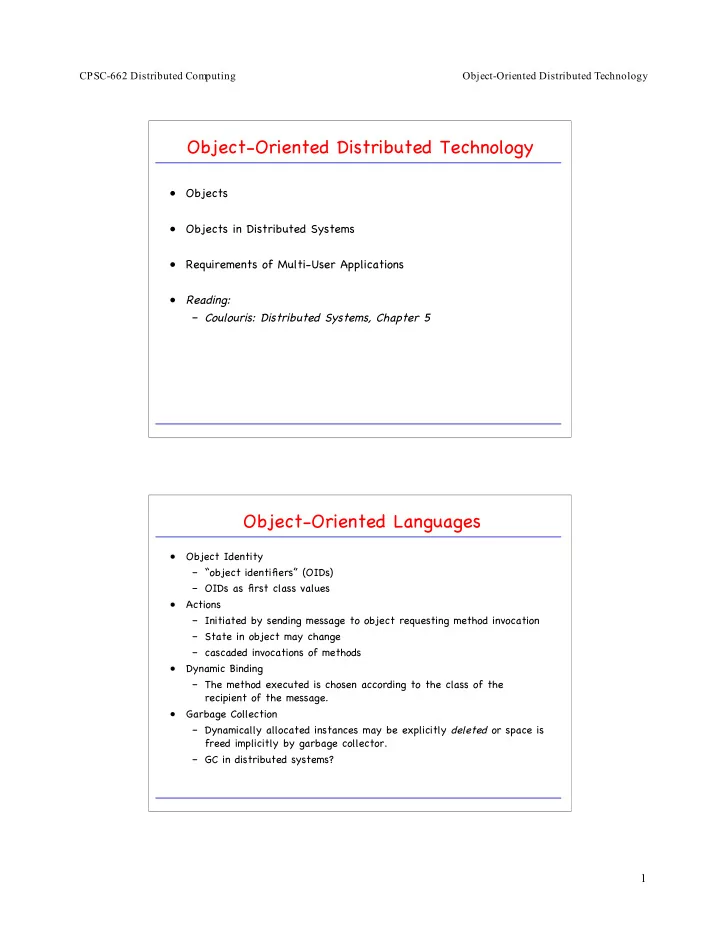

CPSC-662 Distributed Computing Object-Oriented Distributed Technology Object-Oriented Distributed Technology • Objects • Objects in Distributed Systems • Requirements of Multi-User Applications • Reading: – Coulouris: Distributed Systems, Chapter 5 Object-Oriented Languages • Object Identity – “object identifiers” (OIDs) – OIDs as first class values • Actions – Initiated by sending message to object requesting method invocation – State in object may change – cascaded invocations of methods • Dynamic Binding – The method executed is chosen according to the class of the recipient of the message. • Garbage Collection – Dynamically allocated instances may be explicitly deleted or space is freed implicitly by garbage collector. – GC in distributed systems? 1
CPSC-662 Distributed Computing Object-Oriented Distributed Technology Objects in Distributed Systems • Object Identity in a Distributed System – Remote object identifiers (ROIDs) – Ex. Java: ROID = endpoint (Java vm) + identifier (ObjID) – ROIDs as first-class values – Service for comparing remote object identifiers • e.g. Java: RemoteObject::equals() • Actions in a Distributed Object System – Remote Method Invocation • The Role of Proxies for Transparent RMI – Local proxy for each remote object that can be invoked by local object. – Local proxy behaves like local object, but, instead of executing message, forwards it to the remote object. (client stubs) – Remote object has skeleton object with server stub procedures Proxies and Skeletons communication module request dispatcher skeleton proxy for A X for A reply A ROID module 2
CPSC-662 Distributed Computing Object-Oriented Distributed Technology Proxies and Skeletons (cont) • Proxies: – Need proxies to invoke remote objects. – Proxies are created when needed whenever ROID arrives in Reply message. – ROID module manages proxies and ROIDs. • Dispatchers and Skeletons: – Not necessary for systems with reflection capabilities. – e.g. class Method in Java 1.2 reflection package: method invoke can be called on instance of Method . Dispatcher now generic and skeleton unnecessary. Arguments and Results in RMI • Semantics of passing arguments for RMI in object-oriented languages needs to be defined. Why? • Argument and Result passing in Java RMI: – When type of parameter is defined as remote interface, argument or result is passed as ROID. – Other non-remote objects may be passed by value if they are serializable . • Which objects can be accessed by RMI? – Any object can be accessed by RMI – Distinguish between remote objects and local objects. (e.g. keywords or classes with interface compiler) – Use interface definition language (IDL) • Problem: migration/replication 3
CPSC-662 Distributed Computing Object-Oriented Distributed Technology Dynamic Binding • Dynamic method binding should also apply to RMI. • Smalltalk: Allow any message to be sent to any object, and raise exception if method is not supported. – Distributed Smalltalk: general-purpose proxies. • Java RMI: – dynamic binding as a natural extension of local case – Example: Shape aShape = (Shape) stack.pop(); float f = aShape.perimeter(); Garbage Collection • Some languages (Java, Smalltalk) support garbage collection. • Explicit memory management difficult/impossible in distributed environment. • Distributed garbage collection typically realized in ROID modules. Each ROID module: – keeps track how many sites hold remote ROIDs for each local object (maintains holders table) – informs other ROID modules about generation/deletion of ROIDs for their local objects (through the use of addRef() and removeRef() ) • Local garbage collector collects objects with no local or remote references. • Reference counting ( addROID() / removeROID() ) over unreliable networks? 4
Recommend
More recommend